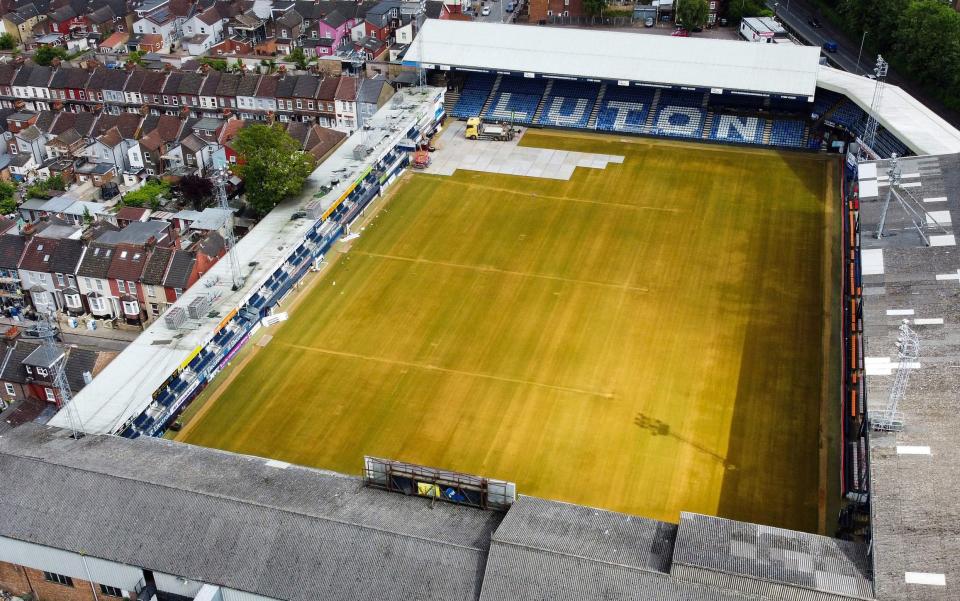When Luton Town were promoted to the Premier League, many wondered: how will Erling Haaland and the rest of Manchester City’s treble-winning aristocracy react when they walk into Kenilworth Road? What will they think as they walk through a main entrance wedged between a small parking lot and a bus highway? How will they cope in a dressing room smaller than a broom cupboard at the Etihad Stadium? Well, we’ll find out on Sunday.
The image of the game’s highly paid superstars standing in the crumbling environs of a stadium, sandwiched between modest terraced houses, is telling. Because never in the history of the Premier League has there been such a big difference between the finances of two clubs. This is less of a David vs. Goliath confrontation, pitting Croesus against the widow and her coin.
A quick look at the numbers tells you everything you need to know about the wealth gap between these two operations. Last season City achieved a record turnover of £712 million, with profits doubling from £41 million to £80 million. Meanwhile, Luton earned £17.7 million, making a loss of £6.4 million.
Look closer and the gap only widens. Matchday revenue at the Etihad last year was £2.31 million per match, a figure that will increase significantly when the magnificent new North Stand development is completed, bringing the stadium’s capacity to 62,000. At Kenilworth Road, matchday revenues for the entire season amounted to £4.9 million (or £178,000 per match). That’s no real surprise as ticket prices for Sunday’s meeting were £36 before they all sold out. For City’s next home match against Crystal Palace, hospitality packages are still available from £750.


Yet this is not a one-off cup match, Have City against Have Not Town. These are two clubs that operate in the same division. And as Luton proved in their midweek match against Arsenal, this is a club determined to compete, even if its bank accounts span completely different universes.
During that match with Arsenal, the home fans amused themselves by belting out the chant “Conference champions, you will never sing that” at their illustrious visitors. It is sung as both a point of pride and anger. Proud because it was only fourteen years ago that the club – which was relegated the season before the first Premier League and therefore missed the opportunity to enjoy the income stream – had to fight its way up from the fifth tier. And anger at the reasons they were deposited there in the first place. The 30-point deduction imposed on them after they came into administration in 2008 was the very definition of kicking a club when it is in trouble.
Conference champions, you will never sing that🎶
I just want to say how great our away support has been this season. Completely surpassed today by 70,000 home fans. We are proud every game this season.
Let’s go again🧡 pic.twitter.com/oX5DSjweuR
— Zac Neal (@NonLeagueZac) November 11, 2023
Given the 115 charges of financial breaches hanging over City, which the club vehemently denies, it is a chant that may take on a different tone on Sunday. If Luton were out of the competition for breaking one rule – don’t go bankrupt – what possible punishment would be appropriate for the “115ers”? Although in reality such draconian measures are unlikely. Not least because Luton, a club then on its knees, did not have the financial resources to guarantee the level of legal assistance available to City.
But in many ways the nightmare of their collapse has shaped Luton’s financing approach ever since. This is a club in which care and caution are anchored. Take the makeup of both parties on Sunday. While City can pay £100m for Jack Grealish and tempt Haaland to the club on wages that top £40m per year, Luton’s record signing is Ryan Giles, signed from Wolves for £5m in the summer.
Under the excellent leadership of Rob Edwards, they have relied on improving players that others did not appreciate. Like centre-back Teden Mengi, who was bought from Manchester United for an undisclosed fee and now plays with the kind of authority that makes you wonder what his former club was doing. Or Ross Barkley, whose career at Nice fell into well-paid obscurity, was brought in on a free transfer and once again performed against Arsenal as he did in his glory days at Everton.


Edwards, with typical modesty, declined to take any credit for Barkley’s return to form, preferring to insist it is the player himself who is responsible. But the fact is that he has developed a side that challenges all assumptions of football finance. The general rule is: the higher the wage bill, the higher the position in the league. And while City’s clever management system has seen them get some money back for their outgoings, they still have the third highest wage bill in the division, behind overpaying players Chelsea and Manchester United. Luton’s is by far the lowest in the division. Yet of the three promoted teams from last season, they seem to have the best chance of surviving.
The challenge for Edwards is to continue the fight against standard expectations. And keep his club in the division. Because this season, thanks to the exponential increase in broadcast revenue that comes with promotion to the top flight, Luton’s revenues could exceed £120 million. The precedent is Brentford, who jumped from £15m in the 2020/21 Championship season to £140m for their first in the Premier League.
And Brentford is an excellent role model for Luton. Unlike Blackpool, where the proceeds from a big season were largely funneled into the company bank accounts of the then owners, the board at Kenilworth Road is determined to invest the windfall for the future. The bulk of the new money will be spent on the new £165m stadium at Power Court, due to open at the start of the 2025-2026 season. As with Brentford’s move to their new home, if they could open this 20,000 capacity facility after a few years of enjoying the kind of television revenue that City have enjoyed over the last twenty years, business will become very different for a club once kicked out of the competition. due to his financial mismanagement.
But that’s for the future. For now, Edwards and his team have more pressing concerns. And in reality, they may be hoping that when Haaland and his mates walk through the doors of Kenilworth Road, the disparity with their home environment will make them feel very uncomfortable indeed.